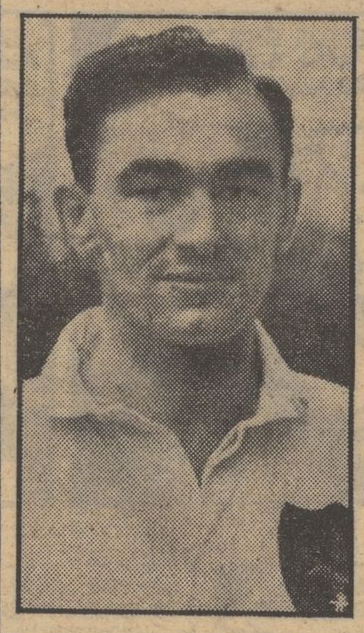
Born: Ammanford 1926. Died: Islington 1986
Clubs: Ammanford RFC, RAF, Cambridge University, Harlequins, London Welsh, Barrow Rugby League.
Hugh Lloyd-Davies represented Wales XV while at Cambridge in the ‘Victory International’ non-Test matches between December 1945 and April 1946. Players have recently been awarded ‘President Caps’ for playing in these non-capped games.
In 1947, two Welsh players represented Cambridge in the annual Varsity match against Oxford University. One was John Gwilliam, formerly of Monmouth School, who progressed to captain Wales during Grand Slam victories of 1950 and 1952 and played in the notable victories over Australia in 1947 and the All Blacks in 1953.
The other player was Rheinallt Hugh Lloyd-Davies described as a full back of ‘skill and experience’. He made a name for himself that day converting two penalties to score all the match points in a 6–0 Cambridge victory in the 1947 Varsity match. However, Lloyd-Davies history followed a rather different path to Gwilliam!
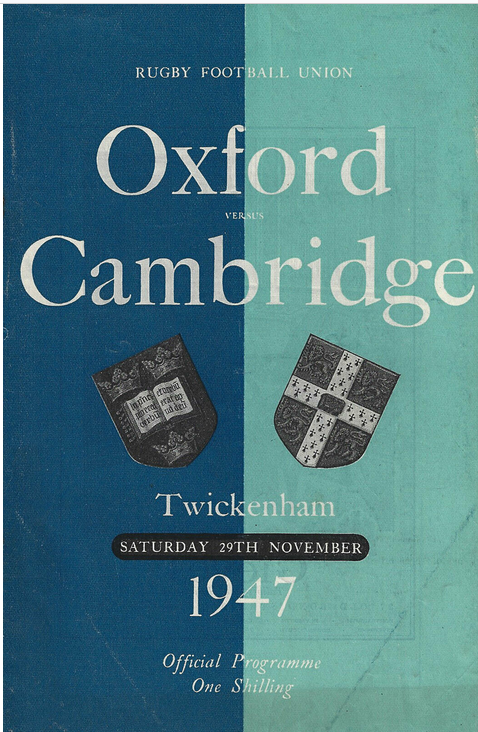
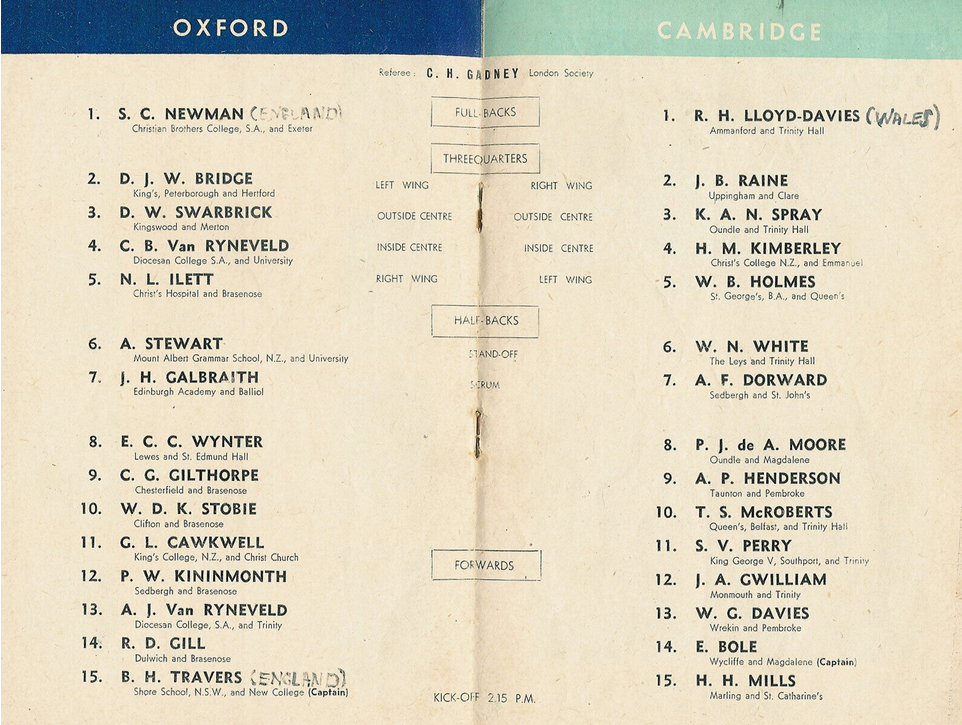
Hugh Lloyd-Davies also represented Wales XV (RU) while at Cambridge in the ‘Victory International’ non-Test matches between December 1945 and April 1946. The Victory Internationals were played after the end of World War II. No full caps were awarded for these games as the international matches were not recognized as “official” (“capped matches”) by British unions due to the absence of many players still serving in the armed forces. This was something the Hugh-Davies resented and he was never chosen to play full back for Wales again.
The Welsh selectors would prefer the safer and less experience Frank Trott of Cardiff or pre-war international Howard Davies of Llanelli. In the England victory international, Hugh-Davies did not have the happiest of games, allowing Dicky Guest to go round him twice to win the match.
This is the history of Rheinallt Hugh Lloyd-Davies, a womaniser and an alcoholic, life spent in and out of prison, who signed for Barrow Rugby League becoming the first Cambridge Blue to turn professional, playing just five games before disappearing!
Lloyd-Davies was born in Tycroes near Ammanford in 1925, He had family links through his mother with the Tycroes bus firm, Williams and Rees, his father a bus conductor for the firm.
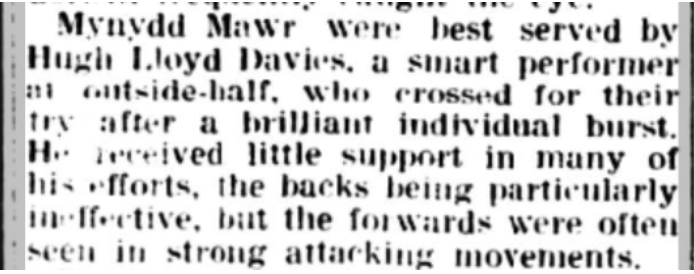
From a young age it was clear that Lloyd-Davies was a talented rugby player. Whilst at Mynydd Mawr school, he was described as ‘smart performer at outside half’. He attended Amman Valley County School and represented Welsh Schools at rugby and played for Ammanford RFC.
After leaving school he studied law at University of South Wales and Monmouthshire, Cardiff. He later joined the RAF, served during the Second World War, and granted a commission which he relinguished in 1947 on Medical grounds. He was discharged from the RAF with neurosis following a severe kick in the face while he was playing rugby for the RAF against Swansea. It is during this period that issues emerged. He became depressed spending 9 weeks in a mental home and then a workhouse in Hunslet, Leeds.
He read Law at Trinity Hall, Cambridge intending to become a barrister. He was selected to play at full back in the Varsity but very nearly missed the match. He failed to arrive for the appointed meeting place for the journey to Twickenham on the morning of the match. Clem Thomas. who was travelling with the team, went to look for him and found him asleep from his heavy drinking the night before and had to get him ready for the match! He was eventually dropped from the side as refused to train and and replaced by Barry Holmes, an Argentinian who was capped by England.
The journalist Alan Watkins, described Lloyd-Davies as a terrible snob and stated that Lloyd-Davies added the hyphen to his surname and described himself as coming from ‘an old Carmarthenshire county family’ in an attempt to improve his social status.
Following Cambridge, Lloyd-Davies entered Gray’s Inn, the traditional Inn of Court for Welshman, though he was never called to the bar. He played briefly for Swansea and London Welsh. He lived for a while in London where he turned out for Harlequins though after running up debts he was bailed out by the club’s president, and local MP, Sir Wavell Wakefield.
It is in 1950 that the story takes a rather unusual twist. He was a teacher at Walney Island Boys School, Barrow and signed professionally for £1000 with Barrow Rugby League side for £8 a week. The 1950s were Barrow’s heyday and appearing no less than three times at Wembley. He only played 5 games, his last match being against Warrington, before dissappearing.
Mr. John Atkinson, chairman of Barrow Rugby Club, said they were anxious about the lack of news concerning him: ‘It is true we paid him a £1,OOO signing on fee” he said “We feel he as not done right after receiving the money, but we are not anxious to make a big fuss about it. We feel a quiet talk with him would straighten matters out.”
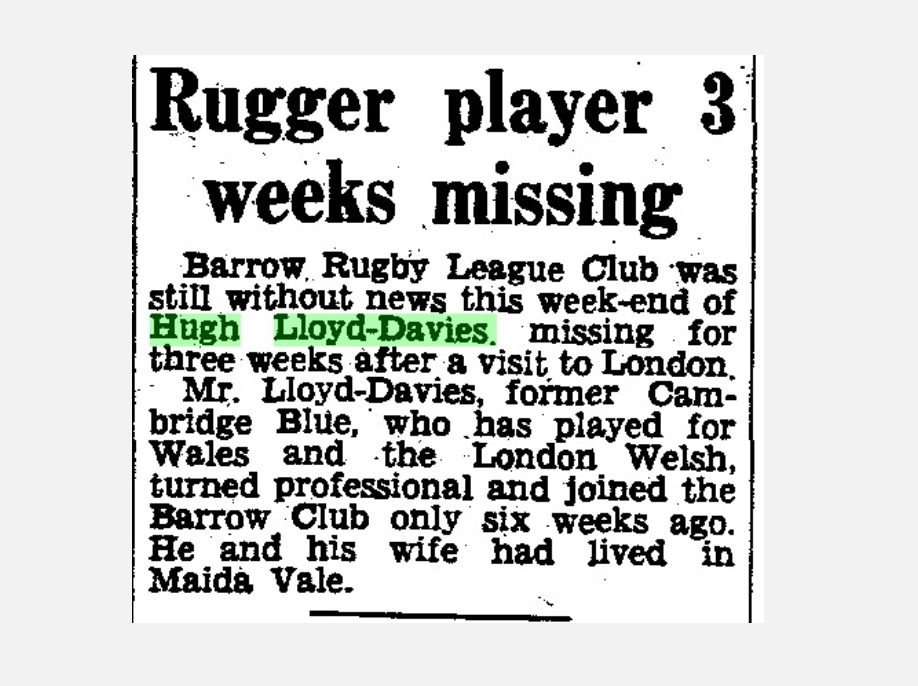
He went missing for three weeks. He claimed that he was given leave by his school to visit London for legal studies at Gray’s Inn. Even his wife, living at Maida Vale, was unaware of his whereabouts!
He was dismissed by Barrow in March 1951 for failing to report to the club. Lloyd-Davies later claimed that Barrow had promised him a house but did not stick to the contract.
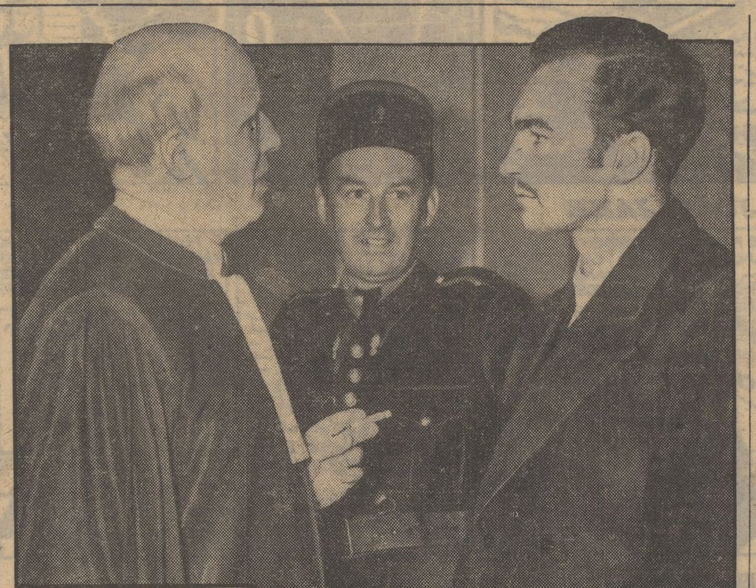
In June 1951, Lloyd-Davies is in trouble with the law as he is arrested in Paris for failing to pay his restaurant bills and having a passport which was not his. A night club proprietor in Montmartre sent for police and complained that Mr. Lloyd-Davies had refused to settle a bill for £23. Police recognised Lloyd-Davies as a British tourist about whom two other night club proprietors were alleged to have made similar complaints for £12 and £13. Mr. Lloyd-Davies gave his address as Barrow-in-Furness, Lancashire. He spent three weeks in the Sante Prison but then acquitted of charges of not paying night-club bills and of entering France without a passport.
There is further trouble on his arrival in the UK as he is arrested and charged with fraud at Dover. The arrest was related to an incident in Liverpool. He was charged with unlawfully obtaining a ladies dress ring with diamond and emerald clasp and a pair of cuff links with RAF wings by false pretences from a Arthur Gordon Batty, a Dale Street Liverpool jeweller. He claimed he was a barrister with chambers in Liverpool and tendered a cheque for £94. The cheque was returned from the bank marked ‘return to drawer. The same day he pawned the cuff-links for £10 and the ring for 2£ 8s.
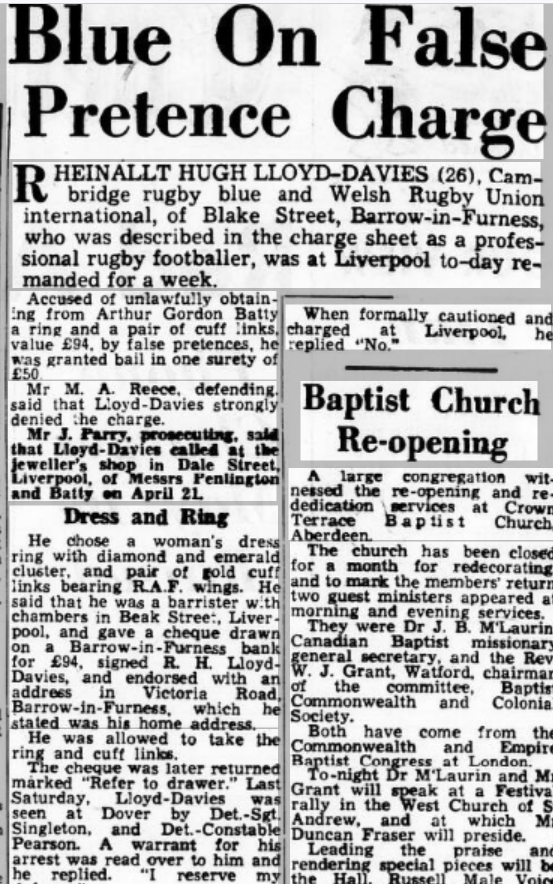
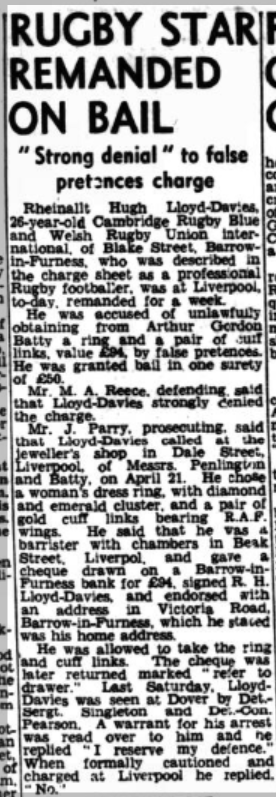
He pleaded guilty and sentenced to 9 months in prison at Liverpool City Quarter Sessions for fraud. His address on sentencing was ‘Y Fron’, Tycroes.
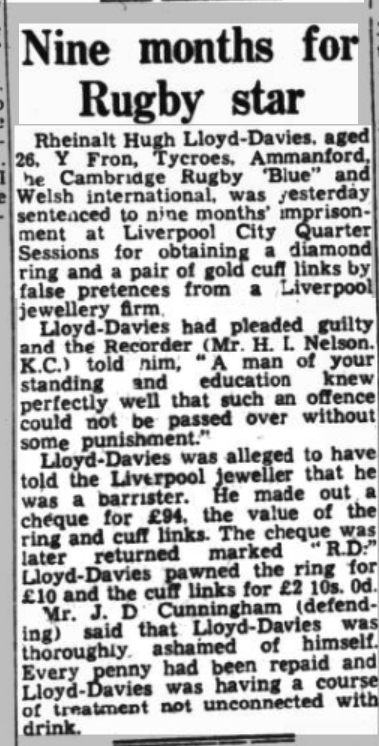
Mr J Cunningham defending said that Lloyd-Davies met certain men with whom he had been associated with the RAF in London and there was completely nonsensical spree which ended in France. Every penny had been repaid and Lloyd-Davies was having a course of treatment not unconnected with drink. He also said Lloyd-Davies was thoroughly ashamed of his behaviour.
Mr H.C Nelson QC said: ‘A man of your standing and education knew perfectly well that such offence could not be passed over without some punishment’
Following his release in 1952, he turned out for Llanelli Rugby League side against Ystradgynlais. However, there was more trouble ahead. This time in London. In December 1952, he was remanded for a week in custody at Bow Street on charges of theft that he eventually pleaded not guilty to all charges. Lloyd-Davies was a student at student at Grays Inn and had access to the Lincoln’s Inn students common room. On December 16th, he stole a wallet from Stone Buildings, Lincoln’s Inn and on December 17th stole a black overcoat and fawn raincoat containing a bankers draft for £120 from the library at Lincoln’s Inn. The bankers draft was later presented at a bank bearing Lloyd-Davies description. He was committed to Central Committee Court on 3 charges. The magistrates also asked for a medical report.
He was by now a single man and had worked as a labourer, cleaning roads and sweeping gutters in Wales. During the trial, it was said that at Cambridge he was known as a courageous man but something ‘snapped in his brain’.
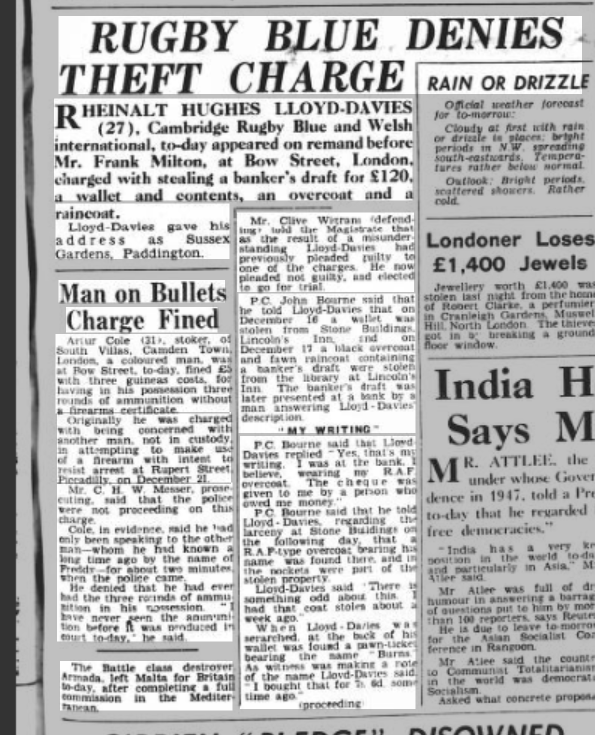
Lloyd-Davies was sentenced to 20 months gaol for theft at the Old Bailey. Passing sentence, ‘your case is indeed a tragedy. You have had opportunites of life afforded to you which few young men have had. Many of them you made themselves. Your prowress in rugby football is well know but I have to deal with the case of many mean thefts from fellow law students’.
The law breaking continued over the years. In 1964, Hugh Lloyd Davies, 39, of Chestnut-grove, Sudbury, Middlesex, was jailed for six months at Marlborough-street for stealing four law books worth £13 from Foyles, Charing Cross road, London.
In 1971 he was committed to custody for obtaining a meal from the Costa del Sol restaurant, Fulham rd, Chelsea by deception. He had by now 11 previous convictions, including another one in 1971, obtaining goods by forged instruments when he was given a two year suspended sentence.
There were reports of sightings, on one occasion in the company of Jack Doyle, the former boxer. He slept rough, and ended his days passing himself off as a retired colonel working as a gardener for Islington Council. Lloyd-Davies died in 1986 and sadly there was no obituaries. He was aged 58.
Lloyd-Davies was not officially capped but became a repicient of a President cap which is given to a specific group of players who represented their country between 1945 and 1979, but missed out on international recognition at the time. The initiative included a group of 25 players who featured across seven matches including the ‘Victory Internationals’ of 1945 and 1946 – who are now honoured for representing the nation in rugby union.
The Welsh Rugby Union put a call out for information to help find the family of Rheinallt Hugh Lloyd-Davies who played in the 1945 victory international against France. Rheinallt Hugh Lloyd Davies’s President’s Cap was accepted by his nephew Charles Raw-Rees in 2014.
